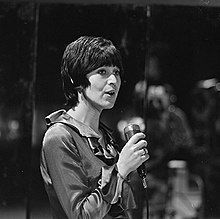Sharon Tandy
| Sharon Tandy | |
|---|---|

Sharon Tandy (Dutch TV, 1968)
|
|
| Background information | |
| Birth name | Sharon Finkelstein |
| Born |
18 September 1943 Johannesburg, South Africa |
| Died | 21 March 2015 (aged 71) London, England |
| Genres | Blue-eyed soul, freakbeat |
| Years active | 1965–2015 |
| Labels | Pye Records, Mercury Records, Atlantic Records |
| Associated acts |
Les Fleur de Lys Booker T. & the M.G.'s Isaac Hayes |
Sharon Tandy (born Sharon Finkelstein; 18 September 1943 – 21 March 2015) was a South African singer who achieved some success in the United Kingdom in the 1960s as part of the blue-eyed soul and psychedelic movements. In 1966, she recorded some songs at Stax studios, a rarity for a white singer. She also had several chart hits in South Africa in the 1970s.
Based in Johannesburg, South Africa, Tandy appeared in South Africa's first beat film, Africa Shakes, and moved to England in 1964 at the suggestion of Frank Fenter, UK head of Atlantic Records, whom she later married. She released several singles between 1965 and 1969, and although none was a hit, she appeared on several contemporary television programmes, such as Beat Club. She has been described by Richie Unterberger as "blue-eyed soul singer rather in the mold of Dusty Springfield, both in terms of her voice and her versatility, blending various shades of soul, British pop, and even some tinges of mod-psychedelia." Her voice has also been compared to those of Julie Driscoll and Christine Perfect.
In 1966 she recorded tracks at Stax Records' McLemore Avenue studios, backed by Booker T. & the M.G.'s and Isaac Hayes, and was an opening act on the 1967 Stax/Volt Tour of Europe. That year she also teamed up with another of Fenter's bands, Les Fleur de Lys and recorded several singles for the Atlantic label and a session for John Peel's "Top Gear". She recorded a single for Polydor in 1967 credited to "Debrah Aire" featuring more pop styled tracks, but this also flopped. However, the combination of lack of commercial success and the breakdown of her relationship with Fenter led to her return to South Africa in 1970.
...
Wikipedia
